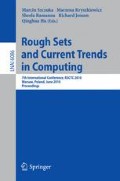Abstract
Grouping data into meaningful clusters is an important data mining task. DBSCAN is recognized as a high quality density-based algorithm for clustering data. It enables both the determination of clusters of any shape and the identification of noise in data. The most time-consuming operation in DBSCAN is the calculation of a neighborhood for each data point. In order to speed up this operation in DBSCAN, the neighborhood calculation is expected to be supported by spatial access methods. DBSCAN, nevertheless, is not efficient in the case of high dimensional data. In this paper, we propose a new efficient TI DBSCAN algorithm and its variant TI-DBSCAN-REF that apply the same clustering methodology as DBSCAN. Unlike DBSCAN, TI-DBSCAN and TI-DBSCAN-REF do not use spatial indices; instead they use the triangle inequality property to quickly reduce the neighborhood search space. The experimental results prove that the new algorithms are up to three orders of magnitude faster than DBSCAN, and efficiently cluster both low and high dimensional data.
Access this chapter
Tax calculation will be finalised at checkout
Purchases are for personal use only
Preview
Unable to display preview. Download preview PDF.
References
Beckmann, N., Kriegel, H.P.: The R*-tree: An Efficient and Robust Access Method for Points and Rectangles. In: Proc. of ACM SIGMOD, Atlantic City, pp. 322–331 (1990)
Elkan, C.: Using the Triangle Inequality to Accelerate k-Means. In: Proc. of ICML 2003, Washington, pp. 147–153 (2003)
Ester, M., Kriegel, H.P., Sander, J., Xu, X.: A Density-Based Algorithm for Discovering Clusters in Large Spatial Database with Noise. In: Proc. of KDD 1996, Portland, pp. 226–231 (1996)
Guttman, A.: R-Trees: A Dynamic Index Structure For Spatial Searching. In: Proc. of ACM SIGMOD, Boston, pp. 47–57 (1984)
Kryszkiewicz, M., Lasek, P.: TI-DBSCAN: Clustering with DBSCAN by Means of the Triangle Inequality, ICS Research Report, Warsaw University of Technology (April 2010)
Kryszkiewicz, M., Skonieczny, Ł.: Faster Clustering with DBSCAN. In: Proc. of IIPWM 2005, Gdańsk, pp. 605–614 (2005)
Moore, A.W.: The Anchors Hierarchy: Using the Triangle Inequality to Survive High Dimensional Data. In: Proc. of UAI, Stanford, pp. 397–405 (2000)
Stonebraker, M., Frew, J., Gardels, K., Meredith, J.: The SEQUOIA 2000 Storage Benchmark. In: Proc. of ACM SIGMOD, Washington, pp. 2–11 (1993)
Zhang, T., Ramakrishnan, R., Livny, M.: BIRCH: A New Data Clustering Algorithm and its Applications. Data Mining and Knowledge Discovery 1(2), 141–182 (1997)
Author information
Authors and Affiliations
Editor information
Editors and Affiliations
Rights and permissions
Copyright information
© 2010 Springer-Verlag Berlin Heidelberg
About this paper
Cite this paper
Kryszkiewicz, M., Lasek, P. (2010). TI-DBSCAN: Clustering with DBSCAN by Means of the Triangle Inequality. In: Szczuka, M., Kryszkiewicz, M., Ramanna, S., Jensen, R., Hu, Q. (eds) Rough Sets and Current Trends in Computing. RSCTC 2010. Lecture Notes in Computer Science(), vol 6086. Springer, Berlin, Heidelberg. https://doi.org/10.1007/978-3-642-13529-3_8
Download citation
DOI: https://doi.org/10.1007/978-3-642-13529-3_8
Publisher Name: Springer, Berlin, Heidelberg
Print ISBN: 978-3-642-13528-6
Online ISBN: 978-3-642-13529-3
eBook Packages: Computer ScienceComputer Science (R0)

